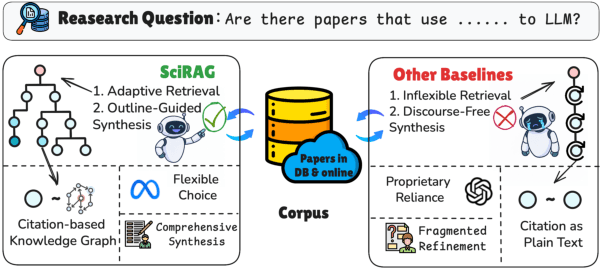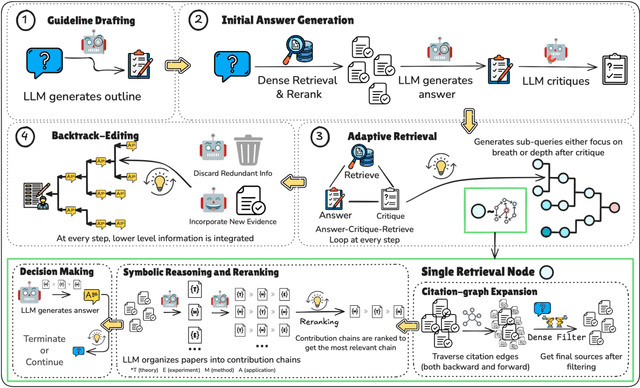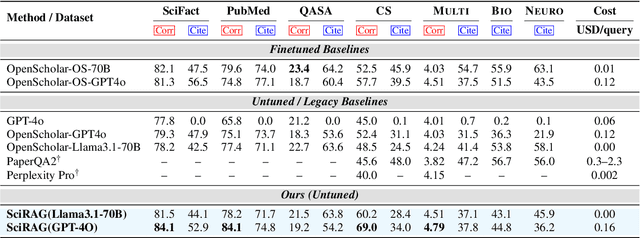Yilun Zhao
Rethinking Composed Image Retrieval Evaluation: A Fine-Grained Benchmark from Image Editing
Jan 22, 2026Abstract:Composed Image Retrieval (CIR) is a pivotal and complex task in multimodal understanding. Current CIR benchmarks typically feature limited query categories and fail to capture the diverse requirements of real-world scenarios. To bridge this evaluation gap, we leverage image editing to achieve precise control over modification types and content, enabling a pipeline for synthesizing queries across a broad spectrum of categories. Using this pipeline, we construct EDIR, a novel fine-grained CIR benchmark. EDIR encompasses 5,000 high-quality queries structured across five main categories and fifteen subcategories. Our comprehensive evaluation of 13 multimodal embedding models reveals a significant capability gap; even state-of-the-art models (e.g., RzenEmbed and GME) struggle to perform consistently across all subcategories, highlighting the rigorous nature of our benchmark. Through comparative analysis, we further uncover inherent limitations in existing benchmarks, such as modality biases and insufficient categorical coverage. Furthermore, an in-domain training experiment demonstrates the feasibility of our benchmark. This experiment clarifies the task challenges by distinguishing between categories that are solvable with targeted data and those that expose intrinsic limitations of current model architectures.
Patient-Similarity Cohort Reasoning in Clinical Text-to-SQL
Jan 14, 2026Abstract:Real-world clinical text-to-SQL requires reasoning over heterogeneous EHR tables, temporal windows, and patient-similarity cohorts to produce executable queries. We introduce CLINSQL, a benchmark of 633 expert-annotated tasks on MIMIC-IV v3.1 that demands multi-table joins, clinically meaningful filters, and executable SQL. Solving CLINSQL entails navigating schema metadata and clinical coding systems, handling long contexts, and composing multi-step queries beyond traditional text-to-SQL. We evaluate 22 proprietary and open-source models under Chain-of-Thought self-refinement and use rubric-based SQL analysis with execution checks that prioritize critical clinical requirements. Despite recent advances, performance remains far from clinical reliability: on the test set, GPT-5-mini attains 74.7% execution score, DeepSeek-R1 leads open-source at 69.2% and Gemini-2.5-Pro drops from 85.5% on Easy to 67.2% on Hard. Progress on CLINSQL marks tangible advances toward clinically reliable text-to-SQL for real-world EHR analytics.
Rewarding the Rare: Uniqueness-Aware RL for Creative Problem Solving in LLMs
Jan 13, 2026Abstract:Reinforcement learning (RL) has become a central paradigm for post-training large language models (LLMs), particularly for complex reasoning tasks, yet it often suffers from exploration collapse: policies prematurely concentrate on a small set of dominant reasoning patterns, improving pass@1 while limiting rollout-level diversity and gains in pass@k. We argue that this failure stems from regularizing local token behavior rather than diversity over sets of solutions. To address this, we propose Uniqueness-Aware Reinforcement Learning, a rollout-level objective that explicitly rewards correct solutions that exhibit rare high-level strategies. Our method uses an LLM-based judge to cluster rollouts for the same problem according to their high-level solution strategies, ignoring superficial variations, and reweights policy advantages inversely with cluster size. As a result, correct but novel strategies receive higher rewards than redundant ones. Across mathematics, physics, and medical reasoning benchmarks, our approach consistently improves pass@$k$ across large sampling budgets and increases the area under the pass@$k$ curve (AUC@$K$) without sacrificing pass@1, while sustaining exploration and uncovering more diverse solution strategies at scale.
SciRAG: Adaptive, Citation-Aware, and Outline-Guided Retrieval and Synthesis for Scientific Literature
Nov 18, 2025



Abstract:The accelerating growth of scientific publications has intensified the need for scalable, trustworthy systems to synthesize knowledge across diverse literature. While recent retrieval-augmented generation (RAG) methods have improved access to scientific information, they often overlook citation graph structure, adapt poorly to complex queries, and yield fragmented, hard-to-verify syntheses. We introduce SciRAG, an open-source framework for scientific literature exploration that addresses these gaps through three key innovations: (1) adaptive retrieval that flexibly alternates between sequential and parallel evidence gathering; (2) citation-aware symbolic reasoning that leverages citation graphs to organize and filter supporting documents; and (3) outline-guided synthesis that plans, critiques, and refines answers to ensure coherence and transparent attribution. Extensive experiments across multiple benchmarks such as QASA and ScholarQA demonstrate that SciRAG outperforms prior systems in factual accuracy and synthesis quality, establishing a new foundation for reliable, large-scale scientific knowledge aggregation.
AlphaResearch: Accelerating New Algorithm Discovery with Language Models
Nov 11, 2025Abstract:Large language models have made significant progress in complex but easy-to-verify problems, yet they still struggle with discovering the unknown. In this paper, we present \textbf{AlphaResearch}, an autonomous research agent designed to discover new algorithms on open-ended problems. To synergize the feasibility and innovation of the discovery process, we construct a novel dual research environment by combining the execution-based verify and simulated real-world peer review environment. AlphaResearch discovers new algorithm by iteratively running the following steps: (1) propose new ideas (2) verify the ideas in the dual research environment (3) optimize the research proposals for better performance. To promote a transparent evaluation process, we construct \textbf{AlphaResearchComp}, a new evaluation benchmark that includes an eight open-ended algorithmic problems competition, with each problem carefully curated and verified through executable pipelines, objective metrics, and reproducibility checks. AlphaResearch gets a 2/8 win rate in head-to-head comparison with human researchers, demonstrate the possibility of accelerating algorithm discovery with LLMs. Notably, the algorithm discovered by AlphaResearch on the \emph{``packing circles''} problem achieves the best-of-known performance, surpassing the results of human researchers and strong baselines from recent work (e.g., AlphaEvolve). Additionally, we conduct a comprehensive analysis of the remaining challenges of the 6/8 failure cases, providing valuable insights for future research.
MRMR: A Realistic and Expert-Level Multidisciplinary Benchmark for Reasoning-Intensive Multimodal Retrieval
Oct 10, 2025Abstract:We introduce MRMR, the first expert-level multidisciplinary multimodal retrieval benchmark requiring intensive reasoning. MRMR contains 1,502 queries spanning 23 domains, with positive documents carefully verified by human experts. Compared to prior benchmarks, MRMR introduces three key advancements. First, it challenges retrieval systems across diverse areas of expertise, enabling fine-grained model comparison across domains. Second, queries are reasoning-intensive, with images requiring deeper interpretation such as diagnosing microscopic slides. We further introduce Contradiction Retrieval, a novel task requiring models to identify conflicting concepts. Finally, queries and documents are constructed as image-text interleaved sequences. Unlike earlier benchmarks restricted to single images or unimodal documents, MRMR offers a realistic setting with multi-image queries and mixed-modality corpus documents. We conduct an extensive evaluation of 4 categories of multimodal retrieval systems and 14 frontier models on MRMR. The text embedding model Qwen3-Embedding with LLM-generated image captions achieves the highest performance, highlighting substantial room for improving multimodal retrieval models. Although latest multimodal models such as Ops-MM-Embedding perform competitively on expert-domain queries, they fall short on reasoning-intensive tasks. We believe that MRMR paves the way for advancing multimodal retrieval in more realistic and challenging scenarios.
Hybrid Quantum-Classical Neural Networks for Few-Shot Credit Risk Assessment
Sep 17, 2025Abstract:Quantum Machine Learning (QML) offers a new paradigm for addressing complex financial problems intractable for classical methods. This work specifically tackles the challenge of few-shot credit risk assessment, a critical issue in inclusive finance where data scarcity and imbalance limit the effectiveness of conventional models. To address this, we design and implement a novel hybrid quantum-classical workflow. The methodology first employs an ensemble of classical machine learning models (Logistic Regression, Random Forest, XGBoost) for intelligent feature engineering and dimensionality reduction. Subsequently, a Quantum Neural Network (QNN), trained via the parameter-shift rule, serves as the core classifier. This framework was evaluated through numerical simulations and deployed on the Quafu Quantum Cloud Platform's ScQ-P21 superconducting processor. On a real-world credit dataset of 279 samples, our QNN achieved a robust average AUC of 0.852 +/- 0.027 in simulations and yielded an impressive AUC of 0.88 in the hardware experiment. This performance surpasses a suite of classical benchmarks, with a particularly strong result on the recall metric. This study provides a pragmatic blueprint for applying quantum computing to data-constrained financial scenarios in the NISQ era and offers valuable empirical evidence supporting its potential in high-stakes applications like inclusive finance.
MSRS: Evaluating Multi-Source Retrieval-Augmented Generation
Aug 28, 2025Abstract:Retrieval-augmented systems are typically evaluated in settings where information required to answer the query can be found within a single source or the answer is short-form or factoid-based. However, many real-world applications demand the ability to integrate and summarize information scattered across multiple sources, where no single source is sufficient to respond to the user's question. In such settings, the retrieval component of a RAG pipeline must recognize a variety of relevance signals, and the generation component must connect and synthesize information across multiple sources. We present a scalable framework for constructing evaluation benchmarks that challenge RAG systems to integrate information across distinct sources and generate long-form responses. Using our framework, we build two new benchmarks on Multi-Source Retrieval and Synthesis: MSRS-Story and MSRS-Meet, representing narrative synthesis and summarization tasks, respectively, that require retrieval from large collections. Our extensive experiments with various RAG pipelines -- including sparse and dense retrievers combined with frontier LLMs -- reveal that generation quality is highly dependent on retrieval effectiveness, which varies greatly by task. While multi-source synthesis proves challenging even in an oracle retrieval setting, we find that reasoning models significantly outperform standard LLMs at this distinct step.
AbGen: Evaluating Large Language Models in Ablation Study Design and Evaluation for Scientific Research
Jul 17, 2025Abstract:We introduce AbGen, the first benchmark designed to evaluate the capabilities of LLMs in designing ablation studies for scientific research. AbGen consists of 1,500 expert-annotated examples derived from 807 NLP papers. In this benchmark, LLMs are tasked with generating detailed ablation study designs for a specified module or process based on the given research context. Our evaluation of leading LLMs, such as DeepSeek-R1-0528 and o4-mini, highlights a significant performance gap between these models and human experts in terms of the importance, faithfulness, and soundness of the ablation study designs. Moreover, we demonstrate that current automated evaluation methods are not reliable for our task, as they show a significant discrepancy when compared to human assessment. To better investigate this, we develop AbGen-Eval, a meta-evaluation benchmark designed to assess the reliability of commonly used automated evaluation systems in measuring LLM performance on our task. We investigate various LLM-as-Judge systems on AbGen-Eval, providing insights for future research on developing more effective and reliable LLM-based evaluation systems for complex scientific tasks.
Efficiency-Effectiveness Reranking FLOPs for LLM-based Rerankers
Jul 08, 2025Abstract:Large Language Models (LLMs) have recently been applied to reranking tasks in information retrieval, achieving strong performance. However, their high computational demands often hinder practical deployment. Existing studies evaluate the efficiency of LLM-based rerankers using proxy metrics such as latency, the number of forward passes, input tokens, and output tokens. However, these metrics depend on hardware and running-time choices (\eg parallel or not, batch size, etc), and often fail to account for model size, making it difficult to interpret and obscuring the evaluation of the efficiency-effectiveness tradeoff. To address this issue, we propose E\textsuperscript{2}R-FLOPs, for LLM-based rerankers: ranking metrics per PetaFLOP (RPP) for relevance per compute and queries per PetaFLOP (QPP) for hardware-agnostic throughput. Companied with the new metrics, an interpretable FLOPs estimator is built to estimate the FLOPs of an LLM-based reranker even without running any experiments. Based on the proposed metrics, we conduct comprehensive experiments to evaluate a wide range of LLM-based rerankers with different architecture, studying the efficiency-effectiveness trade-off and bringing this issue to the attention of the research community.
 Add to Chrome
Add to Chrome Add to Firefox
Add to Firefox Add to Edge
Add to Edge